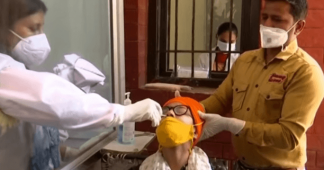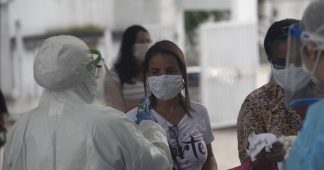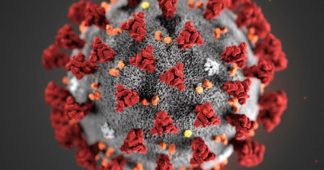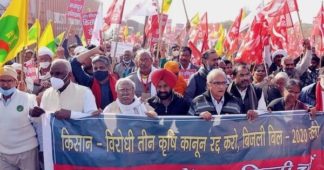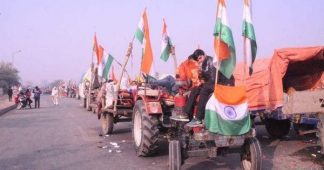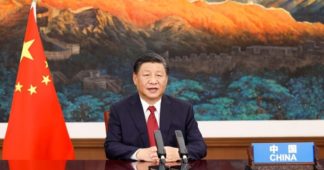By Manoranjan Mohanty
Jan 1, 2021
I hope we have a better year in 2022. After two years of the Pandemic everyone is in a mood of anxiety. No doubt 2021 was a terrible year for the world and for many of us, but we survived after all! We can build upon that hope, grit and imagination that we creatively generated together.
Covid-19, still creating havoc, already took the global death toll to over 5 million lives, disrupted livelihoods and caused much grief, but humanity also discovered the limits of its current development pursuits, thus seeking new ways of building a better global future. At least some of us can notice this if not our rulers.
This year the tensions between US and China escalated, India-China border conflict took the relations decades backward and global peace prospects receded further. At the same time, competing hegemonic frameworks of international relations and world political economy that had emerged out of the Second World War were beginning to crumble. The multiple effects of Covid-19 and global environmental crisis became clearer and the people’s movements exposing inequalities, natural calamities and ubiquitous phenomenon of violence around the world gathered momentum.
Worldwide democratic upsurge against racial and social injustice, patriarchal culture, oppression of nationalities and indigenous peoples and authoritarianism achieved many victories.
India had a terrible year of excessive deaths ( nearly 500,000) a large number during the second wave of Covid-19. The miseries of the workers in the unorganized sector, especially of migrant labourers had brought to the fore the pitfalls of the neo-liberal economy which was being pushed now harder than before causing immense difficulties for the common masses. The trend of hate crimes continued seeking to totally change the character of the secular democratic republic envisaged by the Indian constitution into a monolithic Hindu Rashtra. But the yearlong Kisan Satyagraha ( Farmers Movement) that was a united force of farmers, big and small, cutting across religions and castes succeeded in forcing the Government of India to repeal the three Farm Laws which were typical neo-liberal acts by the rulers to empower the corporates in all sectors of the economy. While repression against civil liberty forces continued with charges foisted against them as in the Bhima-Koregaon Case , the united voice of protest against state repression seen on the aftermath of the legendary tribal rights campaigner Stan Swamy’s custodial death in July showed the continuing strength of democratic rights values in India.
Gratitude to my colleagues in the academic and civil society initiatives for their solidarity and support which made one live life with hope.
CSD
In the Council for Social Development (CSD) we lost three eminent colleagues and a dear helper to Covid-19. Vinay Srivastava, the Anthropolostist was to succeed me as Editor, Social Change in April. I had the misfortune of writing his obituary. In T Haque, CSD had a unique agriculture expert. Ambarish Rai was the lightening rod of our RTE Forum in the movement to make Right to Education a reality with stress on equity, quality and universality. CSD Driver Praveen was a warm and capable human being.
After nearly fifteen years as Editor, Social Change. I handed over charge to my old friend and colleague from Delhi University, Riaz Ahmad. Social Change continued to celebrate its Golden Jubilee with the 2021 Lecture delivered by the Linguist Ganesh Devy. Five of the six volumes of the Series on Social Change in Contemporary India were published by Sage, each carrying selected articles on a theme. Social Change had its special issue in March on Satyagtaha in the 21st Century carrying contributions of some of the participants in the momentous Gandhi 150 seminar in October 2019, including articles by Medha Patkar, Vandana Shiva and Mark Juegensmeyer. Based on this a book edited by me and Mannika Chopra is going to come out.
Social Change deeply mourned some great losses carrying obituaries on Swami Agnivesh, Kapila Vatsyayan, Sunderlal Bahuguna, D L Sheth, T Haque and Gail Omvedt. Gail was one of my closest friends from Berkeley days whose contribution to the feminist and dalit movement in India during the last five decades had immensely influenced my own thinking.
My term as Vice-President, CSD ended in June and I was happily succeeded by JNU Economist Biswajit Dhar.
CSD had to scale down its research programmes under the prevailing circumstances. But the select activities on themes such as New Education Policy, Farm Laws, Labour Migration were relevant and meaningful.
ICS
For ICS (Institute of Chinese Studies) it was a year of big transition though from outside it could go unnoticed. Because, thanks to our dynamic team led by the Director, the Wednesday Seminars (which we had started on the Sapru House Lawns in 1969) continued on line with even more vigour and wider attendance. The flagship journal China Report came out regularly thanks to the competent editorial team and Sage. AICCS (All India Conference of China Studies) was held in Visva Bharati, Santiniketan and the annual India Forum on China went on in Goa University.
But the change was one of gradually restoring ICS’s original character as an interdisciplinary, independent research institute with university-based scholars as Honorary Fellows. The Government of India’s annual grant for six years till 1915 and the Tata Trust grant thereafter had made it possible to have a core research faculty and premises. After that ended, ICS moved to a one floor rented accommodation in Chittaranjan Park with a small research assistant team. A Sandesh Party on 18 December to bid farewell to Madhurima Nundy, Assistant Director and an excellent expert on Comparative Public Health was the only occasion bringing us physically to the new premises. Yes, this was an infrastructure setback, but ICS had already emerged a well-known academic initiative with three new generations of scholars spread all over the country and competently taking it forward. Here too I finally got a promotion from Honorary Fellow since its inception, to Emeritus Fellow.
CTC
The Creative Theory Colloquium (CTC) is growing into a unique intellectual trend thanks to the initiative of a group of bright young scholars of JNU besides the inimitable leadership of two generations of scholars from Delhi University’s DCRC now in JNU, IGNOU, Guwahati, Ahmedabad, Hyderabad and elsewhere . (DCRC reportedly ceased to exist by a resolution of the DU’s Academic Council in 2021.) The participation of the Marcuse Society in the annual CTC on the Teachers Day (5-6 September) this year added a new dimension of interaction between the streams of thought represented by Creative Theory and Critical Theory opening up fresh insights on many subjects relating to social transformation. With no physical or financial infrastructure at present, this initiative does have a promising future for its intellectual value.
Gabeshana Chakra, Odisha
Talking of Infrastructure, our academic venture in Odisha, the Gabeshana Chakra now thirty years old as a forum of research and discussion on Odisha’s development issues, acquired some space in Bhubaneswar temporarily this year. Its fifteen year old research unit, DRI (Development Research Institute) now has a sister body the CLI (Cultures and Languages Institute). While DRI conducts social science research, CLI plans to teach languages, foreign and Indian, and focus on the plurality and complexity of cultural traditions. As Director, CLI, Professor Debendra Dash has many plans to be pursued with the help of the Chairperson Debi Prasanna Pattanayak. I retired as Chairperson, DRI and was succeeded by its former Director, the feminist, peace studies scholar-activist Asha Hans. Lot of expectations are pinned on its new Director Swarnamayee Trpathy who recently retired as Professor of Public Administration, Utkal University. The highlight of Gabeshana Chakra activities during the Pandemic was its weekly discussion online on the conditions of migrant workers leading to publications and policy proposals. Gabeshana Chakra’s prospective plans seem quite encouraging under the leadership of its President Bijaya Kumar Bohidar ably assisted by a host of bright young scholars and activists spread across Odisha and stationed in different parts of India.
Now to the civil society initiatives.
PUDR
PUDR (People’s Union for Democratic Rights, Delhi) crossed its 40th year during the Pandemic. It remained active in the face of much difficulties and harassment. Our colleague, eminent journalist Gautam Navlakha is still in custody of NIA under false charges in the Bhima Koregaon Case awaiting trial. An Amazing group of young intellectuals kept PUDR programmes going. We lost a valued activist, Om Prakash, a human rights scholar and a popular colleague in Political Science who had written his MA dissertation on Dialogue in Democracy with me. Field investigation for which PUDR is known was limited, but a considerable amount of work led to some significant fact-finding reports on custodial deaths, violation of workers’ rights, communal violence, press freedom, among others. PUDR remains one of my main inspirations even though I am unable to make any serious contribution to its work now.
PIPFPD
Pakistan-India People’s Forum for Peace and Democracy (PIPFPD) remained active conducting Pak-India intellectual and cultural discussions online despite tensions between the two governments. Our protest on the revocation of Article 370 relating to Jammu and Kashmir without the consent of the people of the state and the continuation of repression in the area went on with writings and meetings on line. Tapan Bose, Syeda Hamid and M J Vijayan and several others in different parts of the country continued to provide exemplary leadership taking bold initiatives to address political questions to promote peace and human rights in the region.
Here too I was not able to do much except some solidarity actions that gave one some hope for a better future for the people of the subcontinent.
Bandung Spirit Network
An initiative that has brought me much joy and hope during the past few years is the Bandung Spirit Network steered from Paris by the Indonesian scholar, the indomitable crusader for human freedom Darwis Khudorie. In 2020 we were to observe the 65th anniversary of the Bandung Conference which has now been deferred to 2022. The Rise of Asia Conference organized by Darwis in Paris and La Hav every year continued to attract more and more scholars and activists from Asia, Africa and Latin America as well as from Europe and North America to pursue the Bandung agenda of decolonization in every sphere. In 2015 in Bandung, Bidyut and I had met many scholars and activists from around the world who were engaged in struggles for freedom, equality, human rights, self-determination, ecological sustainability, rights of indigenous people. In 2021 this number had grown significantly when we observed Bandung-Belgrade and Havana celebrations reaffirming the essential missions of Non-Aligned Movement and the Tri- Continental.
We were delighted that since April we have a quarterly News Letter under the editorship of Isaac Bazie from Borkina Faso based in Montreal. We had to cancel our annual Bandung Day Symposium on 24 April organized by CSD due to the death of a colleague in Covid. But happily the year saw the formation of the Bandung Spirit Network India consisting of young scholars from different universities who have launched many meaningful programmes already with Rityusha Mani Tiwari as the Convener.
South South Forum
In 2018 when Bidyut and I participated in the South South Forum in Lingnan University, Hong Kong coordinated by two inspiring intellectuals Lau Kin Ji there and Sit Tsui in Chongqing’s Rural Development Institute we found another initiative with the Bandung Spirit. They brought together many of world’s thinkers and activists sharing the decolonization perspective. Through the Global University of Sustainability this aims at pursuing people’s alternatives to dominant development and security models. This Forum facilitates interaction between some of China’s eminent intellectuals such as Wen Tiejun, Wang Hui and Dai Jianhua with many from other countries. I have gained much from the insights flowing from this Forum through the annual deliberations held on line during the past two years.
Global Studies
Bandung Spirit Network and South South Forum kept some of our decolonization aspirations from DCRC days alive which Bidyut and I had been pursuing during our teaching years in University of California at Santa Barnara’s Global Studies Programme ( 2006-2011). My friend from Berkeley days in 1960s Mark juergensmeyer , who turned 80 in 2021 and earned a fabulous Festschrift- was the main force. This programme had the same orientation as ours with formidable names such Richard Falk, Richard Appelbaum and Giles Gunn besides Mark laying down the new discipline of Global Studies. Mark and I are associated with Ambedkar University, Delhi which now runs a vibrant Global Studies Programme, a rare initiative still, as most universities in India are yet to promote this academic programme. Many still confuse Global Studies as (Neo-liberal) Globalisation Studies rather than seize the opportunity to give it a post-colonial turn. Hopefully the Bandung Spirit and South South Forum initiatives will have some effect in future.
The Poetry Festival
Another forum that has given delight and bliss for the last eight years to many of us is the Chandrabhaga Poetry Festival held on the second weekend of January every year in Konark, the Sun Temple in Odisha coast where the now unnoticed Chandrabhaga river meets the sea. Even as an online event for the last two years, it has been a wonderful invitation to imagination . Thanks to Savita Singh, the Hindi Poet and feminist scholar, Odia poets Bijaya Upadhyaya and Ashutosh Parida, and the organizing mastreo Chandrabhanu Pattanayak. A chance discovery that my China expert friend Guilham Fabre is also a French poet added an international dimension to the joy of all with some wonderful poets from France joining us in Konark. For the past three years poet, social scientist Ashwani Kumar has taken CPF to a new level of confluence of Indian and global poetry to the delight of us all, especially our inspiration Poet Jayanta Mahapatra, Editor of now revived journal, Chandrabhaga.
No Apology!
I have written enough.
You must be wondering how come instead of the two line shot on New Year thus far, Mano/Manu/Manoranjan/Bhai/Bapa, Mausa/Jeje wrote this long narrative.
For us, on the health front it was a bad year. I had a brush with cosmos in March – hospitalization ICU, due to Diverticolitis, supposedly age-related- yes I turn eighty in 2022.
Just when I was slowly recovering Bidyut had a bad spell – also hospitalization, ICU, Sodium Fall etc. Children rushed to see us, Berkeley Sanjay from Los Angeles and Jinee Lokaneeta from New York. Our nephew, the Political Scientist and Teachers Movement activist in DU, Biswajit Mohanty had handled the crisis each time. Now we are under 24×7 care, in our Sah Vikas Apartment in Delhi, a most reassuring environment where many of my students – now famous scholars- and colleagues also live, always ready to come by. They were of great help during our health emergencies.
What helped us to get back to some sort of on-going, home-based, usual routine with many ups and downs in health, were you, the most wonderful people on earth and you inspiring work.
I did some writing and more editing between spells of health problems. But the highlights were Jinee Lookaneeta’s much acclaimed book Truth Machines: Policing, Violence and Scientific Interrogations in India (University of Michigan Press/ Orient Blackswan) and Bidyut Mohanty’s just released book A Haunting Tragedy: Gender, Caste and Class in the 1866 Famine of Odisha ( Manohar/ Routledge).
The best thing during the Pandemic has been our WhatsApp video conversation with our grand-daughters in Los Angeles, Raeva, 16 and Adya, 21 listening to a story every day from their grandma and analyzing it most amazingly, bringing in a lot of politics and philosophy! Their talents continue to flourish in arts and culture. And of course some of the online seminars by our groups gave us reasons to live on. Especially the most insightful sessions organized by Akhil Ranjan Dutta and his colleagues at SSRC in Guwahati. Throughout this period, regular chats over phone with friends like G Haragopal from Hyderabad and Shailaja Rabi from Cuttack kept our spirits high. My elder brother, now Swami Shivachidananda’s spiritual messages of universal unity, love and hope always came in moments when I, even as an atheist, needed them most.
We survived 2021 and have reasons to look ahead thanks to all of you.
Let us work and hope for a Better World in 2022.
Happy Holidays!.
Love and warm greetings.
In solidarity,
Jai Jagat
Manoranjan Mohanty
